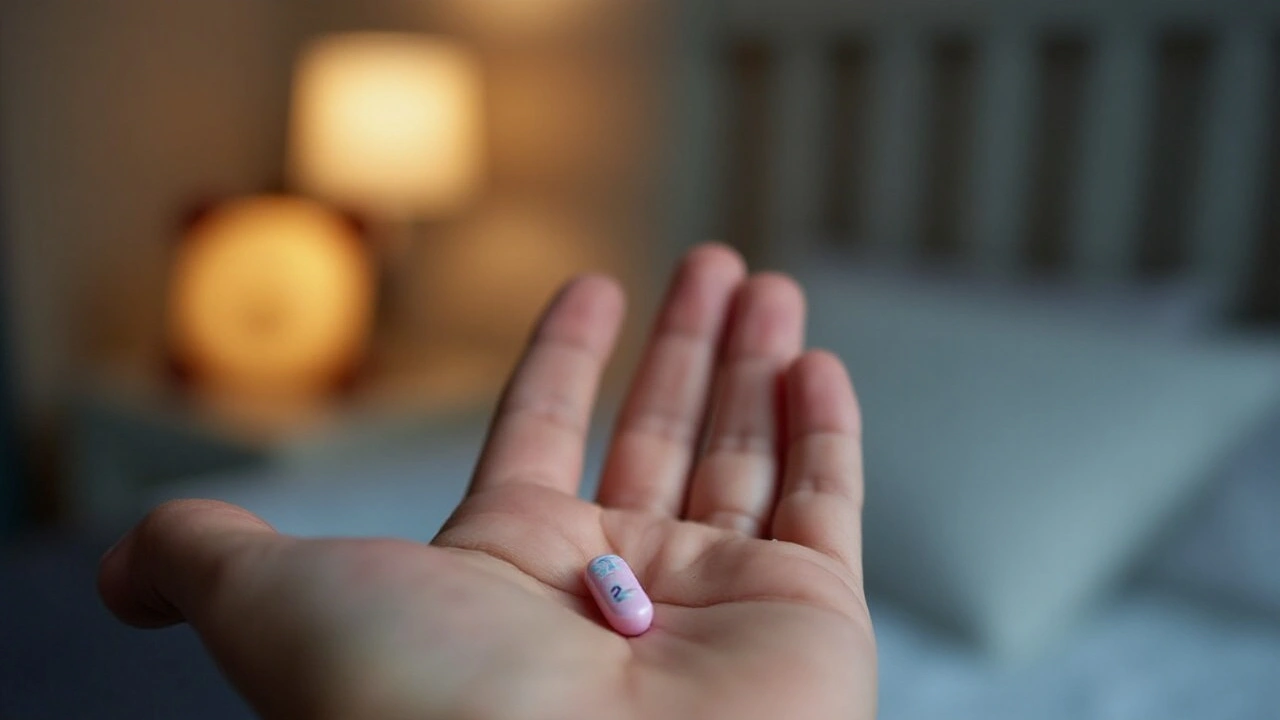
Doxylamine is one of the unsung heroes in the world of sleep aids. Available over the counter, this little pill has helped countless people improve their sleep. But what's the science behind it? How does it really work?
Let's dive into understanding doxylamine and its impact on your sleep. If you've been tossing and turning, desperate for some shut-eye, keep reading. This might be what you've been waiting for.
How Doxylamine Affects Sleep
Doxylamine is widely recognized for its ability to improve sleep, but how exactly does it work? The answer lies in its function as an antihistamine. Antihistamines like doxylamine block histamine receptors in the brain. Histamine is a chemical responsible for wakefulness, so when doxylamine blocks these receptors, it induces drowsiness and helps you fall asleep faster.
Another way doxylamine impacts your sleep is by prolonging the duration of deep sleep. Deep sleep is crucial for physical recovery and mental health. Studies have shown that individuals taking doxylamine experience fewer wake-ups during the night and spend more time in restorative sleep stages. This means improved sleep quality, not just increased sleep duration.
Sleep Efficiency is another area where doxylamine shines. Sleep efficiency refers to the ratio of time spent actually sleeping to the total time spent in bed. Higher sleep efficiency means you spend more time actually sleeping rather than tossing and turning. By helping you fall asleep faster and reducing nighttime awakenings, doxylamine maximizes your sleep efficiency.
It's worth mentioning that doxylamine is often compared to other sleep aids like melatonin or prescription medications. One advantage of doxylamine is its relatively short half-life, meaning it doesn’t cause prolonged drowsiness the next day. This makes it a convenient option for those needing immediate relief from insomnia without the next-day grogginess.
J. Breus, PhD, a well-known sleep expert, once said,
"Doxylamine has been a reliable choice for many people struggling with insomnia. It’s particularly beneficial due to its quick onset and manageable side effects."This endorsement underscores the confidence experts have in doxylamine’s effectiveness. It’s reassuring to know that specialists in the field recognize its value.
It's crucial to note the importance of the correct dosage when taking doxylamine. Too much can lead to undesired effects like extreme drowsiness or headaches, while too little might not be effective. Always adhere to the recommended dosage on the packaging, which is typically 25 mg for adults.
Important Notes
Although generally considered safe, doxylamine can interact with other medications or medical conditions. Therefore, consulting with a healthcare provider before starting doxylamine is a good idea. They can offer personalized advice based on your health history.
Potential Side Effects
While doxylamine is a reliable aid for many people struggling with sleep, it is crucial to understand that it does have potential side effects. Like any medication, it's essential to be well-informed before integrating it into your nightly routine. So, what can users expect when they start taking this sleep aid?
First, one of the most commonly reported side effects is dry mouth. This happens because doxylamine is an antihistamine, and antihistamines can reduce saliva production. People may find themselves waking up parched in the middle of the night or dealing with an uncomfortably dry throat in the morning.
Doxylamine can also cause drowsiness that lasts into the next day. This is known as a “hangover effect,” and it can be particularly troublesome for those who need to be alert first thing in the morning. Users might feel groggy, slow to react, and generally out of sorts. This prolonged drowsiness can interfere with daily activities and responsibilities.
Another side effect to be aware of is dizziness. This can happen because doxylamine affects the central nervous system. People might feel unsteady on their feet, which can be dangerous if they need to move around, especially at night. It’s always a good idea to get up slowly from a sitting or lying position to prevent dizziness.
Older adults might be more susceptible to certain side effects. For example, they could experience more pronounced confusion or disorientation. This age group should use doxylamine with caution and may want to consult a healthcare provider before starting it. Speaking of healthcare providers, it’s wise to discuss any preexisting conditions or medications with them, as doxylamine can interact with other drugs.
Less commonly, some people might experience urinary retention, which means they have trouble completely emptying their bladder. This can be uncomfortable and might lead to additional complications if not addressed promptly. Always pay attention to changes in your body after starting a new medication.
There's also the risk of allergic reactions, although it’s rare. Symptoms might include itching, swelling, and difficulty breathing. If someone suspects they're having an allergic reaction, they should seek medical attention immediately.
Interestingly, some studies suggest that reliance on sleep aids like doxylamine can potentially lead to psychological dependence. Although doxylamine is not known for being highly addictive, people might find themselves anxious at the thought of trying to sleep without it.
Dr. Harriet Klein, a sleep specialist, notes, “It's important for individuals to weigh the benefits and side effects of sleep aids. Each person's experience can be different, so monitoring how you feel and adjusting as necessary is key.”
In summary, while doxylamine can help achieve that coveted good night's sleep, it's not without its challenges. Being aware of potential side effects and taking steps to mitigate them can make your experience with this sleep aid more positive and effective. Stay informed, listen to your body, and consult with professionals as needed to ensure a safe journey to better sleep.

Tips for Safe Use
When it comes to using doxylamine for better sleep, being informed is your best bet. While it's an over-the-counter medication, like any other drug, it should be used with care. First of all, always read the label carefully and adhere to the recommended dosage. Taking more than advised can lead to serious side effects or health risks. For starters, the typical dosage for adults is usually 25 mg taken about 30 minutes before bedtime. It's important to check if the formula you're using has the correct amount, as different brands might vary slightly.
One tip many people might overlook is timing. If you take doxylamine too late at night, you could end up feeling groggy in the morning. It's best to plan your sleep and ensure you have a full 7-8 hours to rest. Setting a consistent sleep schedule can help optimize the effects of the sleep aid. If you find that the medication isn't effective after a week or so, consult your doctor. It might not be the best solution for your insomnia, and prolonged use isn’t generally recommended.
Notably, doxylamine can interact with other medications. If you’re using other prescription drugs or even herbal supplements, make sure to consult with a healthcare provider to avoid potential interactions. Specifically, combining doxylamine with alcohol can amplify drowsiness, which is something to be cautious about. Also, if you have conditions like asthma, glaucoma, or prostate problems, there's a need for extra caution. These conditions can sometimes be worsened by doxylamine.
Awareness of potential side effects is crucial. While doxylamine is effective for many people, it might not sit well with everyone. Common side effects can include dry mouth, dizziness, or blurred vision. If you experience any of these, it’s advisable to stop taking the medication temporarily and speak to a healthcare professional. In rare cases, severe allergic reactions might occur. Watch out for signs like rash, itching, or trouble breathing.
Finally, consider non-drug approaches to improve sleep. Lifestyle changes can often make a big difference. Try developing a bedtime routine that might include turning off electronic devices an hour before bed, reading a book, or listening to calming music. Creating a sleep-conducive environment—by keeping your room dark, quiet, and cool—can also help enhance sleep quality and duration.
“For many people, lifestyle modifications can be just as effective as medication when it comes to improving sleep quality,” Dr. Jane Greer from the National Sleep Foundation states.
If you’re still unsure, always seek professional advice. Doctors and pharmacists can offer you guidance tailored to your specific needs. Use doxylamine responsibly, and it might turn out to be the sleep solution you’ve been searching for.





Comments (19)
Karla Luis
doxylamine is basically the sleepy version of a bad roommate who shows up uninvited and never leaves
it works but god i hate how my mouth feels like the inside of a desert the next day
jon sanctus
this is why america is falling apart
we don't fix our sleep hygiene we just pop a pill like it's candy
doxylamine isn't a solution it's a crutch for people who can't handle stillness
Kenneth Narvaez
the pharmacokinetics of doxylamine succinate demonstrate a T1/2 of approximately 10-12 hours with significant first-pass metabolism via CYP2D6 and CYP3A4 isoforms
its anticholinergic burden is non-trivial and may contribute to cognitive decline in longitudinal use
Christian Mutti
I am deeply concerned about the normalization of pharmacological sleep intervention in our culture. This is not wellness. This is surrender. 🙏
Liliana Lawrence
i just took doxylamine last night and woke up feeling like a zombie who lost a fight with a toaster 😵💫 but hey at least i slept for 7 hours??
Sharmita Datta
doxylamine is a government tool to keep people docile and tired so they dont question the system
they dont want you to be awake and think too much
mona gabriel
i used to take this every night
now i just read in bed and let my body figure it out
the pill worked but the peace didn't
Phillip Gerringer
you people are pathetic
you can't even sleep without chemical assistance
get a real job and stop blaming your insomnia on modern life
jeff melvin
doxylamine is just another gateway drug to benzos
you think you're in control until you're up at 3am wondering why you need two pills now
Matt Webster
if this helped you sleep better and you're not relying on it long term then that's great
everyone's body works differently
no shame in finding what works
Stephen Wark
this whole post is just a pharmaceutical ad disguised as science
they're selling sleep like it's a product
we're all just sleep-deprived zombies now
Daniel McKnight
doxylamine's the quiet hero of the medicine cabinet
not flashy like melatonin
not scary like zolpidem
just there doing its job like a good soldier
respect
Jaylen Baker
I’ve been using doxylamine for 6 months now, and I can’t believe I waited this long. This is life-changing. You deserve rest. You deserve peace. You deserve to sleep like a baby again. 💪🌙
Fiona Hoxhaj
The commodification of sleep through over-the-counter anticholinergics represents a profound epistemological failure of contemporary Western medicine. One must question the ontological status of rest when it is mediated by pharmacological coercion.
Merlin Maria
you're all missing the point
doxylamine isn't the problem
the problem is that we've normalized chronic sleep deprivation as a badge of honor
you're not tired because of stress
you're tired because you chose to be
Nagamani Thaviti
doxylamine is just a trick to make you sleep while they control your dreams
they know what you think when you are unconscious
Kamal Virk
in my country we do not rely on such substances
we practice discipline
we rise with the sun
we sleep when the body is ready
Gina Banh
i stopped taking it after a week
the dry mouth was unbearable
and honestly i felt worse the next day
sleep hygiene > pills
Deirdre Wilson
i tried this once and now i can't sleep without it
am i addicted or just desperate?